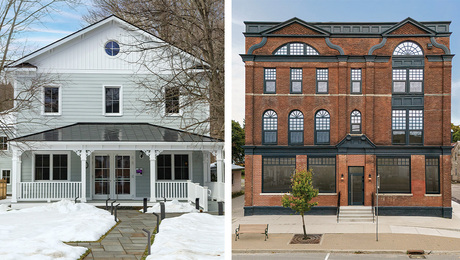Curious what your opinions are on Durock and Denshield Hardibacker. We just bought of first house, and I’m going to put down on 12″ slate in the kitchen. Which one of these would you recommend, and should it be 1/2″ or 1/4″. There is plenty of subfloor underneath. Go ahead and give me the pros and cons of both of them. I know Hardibacker is a lot lighter, but something tells me that Durock will hold up better. Also, what kind of thinset would you recommend for use with slate. Thanks.
Discussion Forum
Discussion Forum
Up Next
Video Shorts
Featured Story

A high-performance single-family home builder shares tips from his early experience with two apartment buildings.
Featured Video
Builder’s Advocate: An Interview With ViewrailHighlights
"I have learned so much thanks to the searchable articles on the FHB website. I can confidently say that I expect to be a life-long subscriber." - M.K.
Fine Homebuilding Magazine
- Home Group
- Antique Trader
- Arts & Crafts Homes
- Bank Note Reporter
- Cabin Life
- Cuisine at Home
- Fine Gardening
- Fine Woodworking
- Green Building Advisor
- Garden Gate
- Horticulture
- Keep Craft Alive
- Log Home Living
- Military Trader/Vehicles
- Numismatic News
- Numismaster
- Old Cars Weekly
- Old House Journal
- Period Homes
- Popular Woodworking
- Script
- ShopNotes
- Sports Collectors Digest
- Threads
- Timber Home Living
- Traditional Building
- Woodsmith
- World Coin News
- Writer's Digest


















Replies
I've used both and I guess I prefer the 1/2" Hardi because I just like thicker sheet goods in general. Bed it in thinset and screw it down with hi-lo screws. An important thing with these products is to read the manufacturer's instructions, which I'm sure you can find online. They give you the recommended applications and compatible adhesives, etc. Read and follow. A good tile store will be able to sell you the right thinset and probably a latex liquid to mix it with, which I also like.
You say there's plenty of subfloor, but it's also the framing you're concerned about. You want almost no deflection in your framing (recommendation is L/360, which ain't much!). It is very common to find a situation where the owner wants tile and the framing is not technically up to it--especially if you're going to put a big island in the middle with a granite top.
Finally, gauged slate or ungauged? It's a time-consuming and skilled task to set either, and especially the ungauged.
It's 2/10 doug fir on 16" centers spanning 10 feet. There is also cross bridging between the joists. The slate is also gauged.
Denshield and hardibacker are two different animals.
Denshield tileguard is a Georgia Pacific product and is a "water resistent" gypsum product. It's easy to cut, like drywall and perhaps a little easier to handle. As I recall, it's limited to 1/2" and, like gypsum board, comes in 4' X 8' sheets. However, I'm not convinced of its water resistance and would be wary of using it in a kitchen or bath. I had to haul a unit of it about 100 miles, all shrinkwrapped and tarped, but one corner of a couple sheets got wet and were a little soggy and unusable.
I've used it once, at the owners request....it was new to me....but from the installers view, it was pretty friendly. We thinsetted it down, taped and thinsetted the joints and used screws. Piece of cake. No problems for the tile guy that I'm aware of.
Personally, I like cement board. But thickness is often dictated by your subfloor structure and/or finished elevations you're trying to achieve to match up with adjoining floor surfaces (carpet, vinyl, wood, etc.). 1/4" is, of course, easier to handle and work with, but may require a lift of underlayment to achieve aforementioned elevations. 1/2" is always better, IMO, especially on larger tiles.
Edited 12/15/2003 8:30:45 PM ET by Notchman
Sorry about that. I realize now that I look at it that I did indeed confuse two products. I too prefer Durock, but curious if anyone else has any views. Maybe things are different other places, but here the 1/2" durock is always cheaper than the 1/4". I've always thought that to be strange, but maybe it's due to supply and demand. Again, all input is appreciated. Thanks again.
Good info from all. L/360 in your case is about 5/16". Follow manuf. to letter (tape,screw and glue) and should have good results.